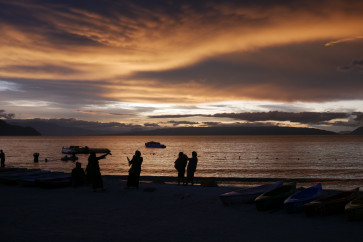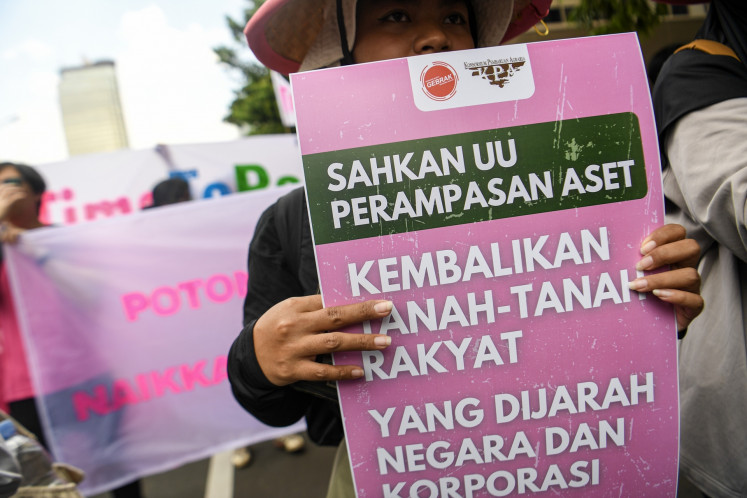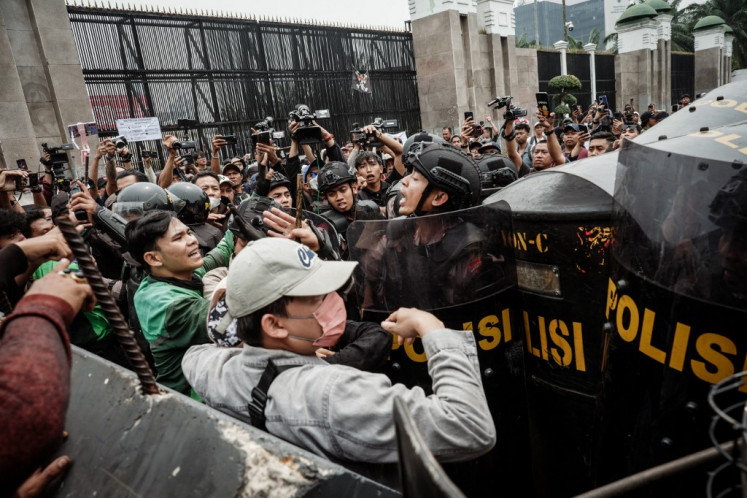Popular Reads
Top Results
Can't find what you're looking for?
View all search resultsPopular Reads
Top Results
Can't find what you're looking for?
View all search resultsRI told to play active role in trade talks
Don’t you agree?: European Union Ambassador to Indonesia, Brunei Darussalam and ASEAN Julian Wilson (left); senior economist and chair of the board of directors of the Centre for Strategic and International Studies (CSIS) Djisman Simanjuntak (center); and director of the market integration directorate of the ASEAN Economic Community Department, Subash Bose Pillai; participate in a public dialogue forum “The Strengthening of Global Trade Architecture: Potential Roles of Indonesia, ASEAN and the European Union” in Jakarta on Tuesday
Change text size
Gift Premium Articles
to Anyone
D
span class="caption" style="width: 510px;">Don’t you agree?: European Union Ambassador to Indonesia, Brunei Darussalam and ASEAN Julian Wilson (left); senior economist and chair of the board of directors of the Centre for Strategic and International Studies (CSIS) Djisman Simanjuntak (center); and director of the market integration directorate of the ASEAN Economic Community Department, Subash Bose Pillai; participate in a public dialogue forum “The Strengthening of Global Trade Architecture: Potential Roles of Indonesia, ASEAN and the European Union” in Jakarta on Tuesday. (JP/R. Berto Wedhatama)
Indonesia should take a more active role in bilateral and regional trade-liberalization negotiations amid the continuing global economic slowdown, a researcher says.
Djisman Simanjuntak, an economist for the Centre for Strategic and International Studies (CSIS), said on Tuesday that Indonesia and ASEAN could become catalysts for growth in Southeast Asian and globally by sticking to an open-trade regime.
Simanjuntak said it was essential for Indonesia to move “progressively” on trade liberalization. “Our credibility is at stake if we continue to let things go the way they are now,” he said during a public dialogue hosted by the European Union and ASEAN in Jakarta.
The nation’s main priorities, according to Simanjuntak, should be the development of the Regional Comprehensive Economic Partnership agreement (RCEP) between ASEAN and its six main partners and a planned Comprehensive Economic Partnership Agreement (CEPA) with the EU.
Indonesia should take the lead in the RCEP to determine the course of negotiations, Simanjuntak said.
ASEAN is slated to commence talks in May on the RCEP with Australia, China, India, Japan, South Korea and New Zealand in hopes of creating the world’s largest economic bloc by 2015.
Economists have claimed that Indonesia would gain better access to trade and higher inflows of investment from the formation of an integrated market of the 16 countries in the Asia-Pacific region, which is home to 3 billion people and has a combined annual gross domestic product (GDP) of US$17.23 trillion.
EU Ambassador to Indonesia, Brunei Darussalam and ASEAN Julian Wilson said that the proposed CEPA with the EU would allow Indonesia and the 27-member bloc to promote global standards, for example to ensure that local labor standards were in compliance with UN rules.
The agreement is also expected by economists to build upon existing individual EU agreements with ASEAN’s 10 member nations.
At present, the EU has a trade agreement with Singapore and is negotiating similar deals with Malaysia and Vietnam.
The EU expected to launch talks in the upcoming weeks, as both sides were in the final stages of agreeing on a negotiation document, according to Wilson.
“We are very keen, because with our economic problems now, growth is coming from Indonesia,” Wilson said. “The more we grow closer to Indonesia, the better it is for our economy.”
Indonesia expects that a CEPA would gradually cut tariffs over a nine-year period by at least 95 percent and potentially by 100 percent.
Bilateral trade between Indonesia and the EU reached ¤25 billion ($32.04 billion) last year, with Indonesia pocketing a surplus of ¤ 5.7 billion, according to EU statistics.
The EU is the second-biggest foreign investor in Southeast Asia’s largest economy, pouring ¤2.3 billion into Indonesia last year, the Investment Coordinating Board said.










